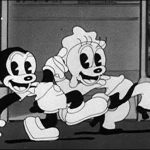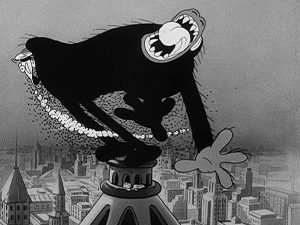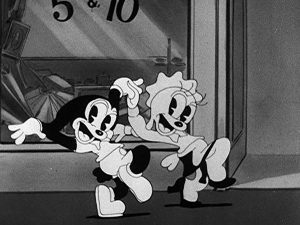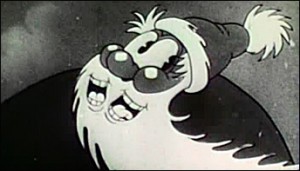


 Sometimes a movie studio or radio station becomes known as a cradle of the stars, because of the talent that passes through on its way up. Thus it was with Walter Lantz’s studio. Several of the people working on these cartoons eventually wound up at Disney, including Clyde Geronimi and Pinto Colvig. Another burgeoning talent that passed through early in his career was Fred “Tex” Avery. In fact, one way to get conversations going among film fans is to try to pick out Avery’s gags in films where his name may or may not be in the credits. Our time period for this week’s coverage brings us some of the last work of Pooch the Pup, and a return to a release schedule of all Oswalds, which would continue for a short time until a move to introduce new faces into the Oswald universe – but that is for a subsequent installment.
Sometimes a movie studio or radio station becomes known as a cradle of the stars, because of the talent that passes through on its way up. Thus it was with Walter Lantz’s studio. Several of the people working on these cartoons eventually wound up at Disney, including Clyde Geronimi and Pinto Colvig. Another burgeoning talent that passed through early in his career was Fred “Tex” Avery. In fact, one way to get conversations going among film fans is to try to pick out Avery’s gags in films where his name may or may not be in the credits. Our time period for this week’s coverage brings us some of the last work of Pooch the Pup, and a return to a release schedule of all Oswalds, which would continue for a short time until a move to introduce new faces into the Oswald universe – but that is for a subsequent installment.
King Klunk (9/4/33) – Don’t let the title fool ya’. This is not about a robot ape. It is a parody of “King Kong”, RKO’s major success of 1933. It manages to take off on both the jungle and New York City settings of the feature film. Pooch is braving his way through the jungle, trying to find the giant ape. Every vignette seems to be captured from the original film, including taking the ape to New York, him breaking all bonds, and taking the sweet young damsel to the top of the Empire State Building for some swatting at biplanes. Only Klunk’s demise seems majorly altered, the ape somehow crashing to the ground in flames, as if he were a plane himself. Songs: “(When It’s) Darkness on the Delta”, a pop from early 1933, written to cash in on the popularity of “When It’s Sleepy Time Down South”. Isham Jones recorded for Victor, Ted Fio Rito for Brunswick, Dell Lampe on Crown. Chick Bullock got a version for Perfect and the dime store labels. Harry Roy covered it for the British market on Parlophone. The Chordettes revived it in traditional barber shop manner for Columba in the 1950’s. The Dukes of Dixieland also issued a single in the ‘50’s on Okeh. Even Thelonious Monk gave it a somewhat discordant moderne treatment for Columbia. Also included: “Chant of the Jungle”, from the 1929 MGM talkie, “Untamed”, a drama with a couple of songs. Nat Shilkret waxed the song for Victor, Paul Specht for Columbia, Vincent Lopez for Perfect, Banner, etc., and Roy Ingraham on Brunswick. Joe Venuti and his New Yorkers (an 11 piece dance band, quite commercial) issued an Okeh performance. The Revelers gave it their vocal style in one of their last performances for Victor. A Phil Jones issued a vocal version which appeared on Van Drke, probably sourced from a Grey Gull master. The Roy Smeck Trio issued a Hawaiian-styled version on Conqueror. The South Sea Serenaders issued a Columbia version for the European market. Glen Gray would record a Decca version a few years after the fact.
 Five and Dime (9/18/33) – Oswald finds romance at the china counter of a five and dime store, ducking out of a rainstorm in a close following of the lyric to the featured song, “I Found a Million Dollar Baby (In a Five and Ten Cent Store)”. Oswald and the girl get evicted from the store for breaking a good deal of the crockery, but proceed to get hitched in a long continuous panning shot, and settle straight into their honeymoon cottage, where they anticipate a blessed event, with Doc Stork waiting on the roof (to give them the bird). The song was a 1931 pop, recorded by Waring’s Pennsylvanians for Victor, Paul Specht for Columbia, a Ben Selvin group for Harmony, Velvet Tone, and Clarion, Sam Lanin for Perfect, Banner, Oriole, Romeo, and Conqueror, and as a vocal record by Bing Crosby for Brunswick. Smith Ballew (going under the name Buddy Blue and his Texans) issued a version on Crown. Don Voorhees issued a paper version on Hit of the Week at your newsstand. Stuart Ross and Joe Sargent (a vocal duet with one of the two on piano) issued a British version on Parlophone. Bobby Byrne (who eventually replaced Tommy Dorsey in the Jimmy Dorsey band) issued a later version on Decca. Jack Leonard (who had left Tommy Dorsey’s band) recorded a vocal on Okeh in the 1940’s. The Sportsmen also revived it for Capitol. The Bob Troup Trio issued a late single on Bullet. Nat King Cole issued an album cut on Capitol’s “The Very Thought of You” LP.
Five and Dime (9/18/33) – Oswald finds romance at the china counter of a five and dime store, ducking out of a rainstorm in a close following of the lyric to the featured song, “I Found a Million Dollar Baby (In a Five and Ten Cent Store)”. Oswald and the girl get evicted from the store for breaking a good deal of the crockery, but proceed to get hitched in a long continuous panning shot, and settle straight into their honeymoon cottage, where they anticipate a blessed event, with Doc Stork waiting on the roof (to give them the bird). The song was a 1931 pop, recorded by Waring’s Pennsylvanians for Victor, Paul Specht for Columbia, a Ben Selvin group for Harmony, Velvet Tone, and Clarion, Sam Lanin for Perfect, Banner, Oriole, Romeo, and Conqueror, and as a vocal record by Bing Crosby for Brunswick. Smith Ballew (going under the name Buddy Blue and his Texans) issued a version on Crown. Don Voorhees issued a paper version on Hit of the Week at your newsstand. Stuart Ross and Joe Sargent (a vocal duet with one of the two on piano) issued a British version on Parlophone. Bobby Byrne (who eventually replaced Tommy Dorsey in the Jimmy Dorsey band) issued a later version on Decca. Jack Leonard (who had left Tommy Dorsey’s band) recorded a vocal on Okeh in the 1940’s. The Sportsmen also revived it for Capitol. The Bob Troup Trio issued a late single on Bullet. Nat King Cole issued an album cut on Capitol’s “The Very Thought of You” LP.
 The Merry Old Soul (11/27/33) – Oswald is having a tooth pulled, and it’s not a pleasant experience. The dentist has a radio tuned in to an operatic singer, while a couple of Oswald’s front teeth are bidding each other farewell. A report comes in over the radio that Old King Cole has the blues. The townspeople’s reaction gives us a string of celebrity caricatures. Greta Garbo “tinks” she stay home. It all winds up in a pie fight that appears to be at a royal banquet, including caricatures of Zasu Pitts and Laurel and Hardy. All this is a dream Oswald s having under the influence of gas. Song: “The Story Book Ball”, a 1918 novelty song recorded at the time by Billy Murray for Victor. Albert Campbell and Henry Burr covered it for Columbia. There was a hot jazz version by the Dixie Rhythm Kings (a bunch of South Side Chicago musicians, many possibly from Earl Hines’ band) in 1929 on Brunswick. Gray Gordon and his Tic Toc Rhythm (a “Mickey Mouse” band whose gimmick was delineating the rhythm with a temple block) recorded a late 30‘s version for Bluebird. The Castle Jazz Band revived it in dixieland style on their own Castle Records in the late 1940’s.
The Merry Old Soul (11/27/33) – Oswald is having a tooth pulled, and it’s not a pleasant experience. The dentist has a radio tuned in to an operatic singer, while a couple of Oswald’s front teeth are bidding each other farewell. A report comes in over the radio that Old King Cole has the blues. The townspeople’s reaction gives us a string of celebrity caricatures. Greta Garbo “tinks” she stay home. It all winds up in a pie fight that appears to be at a royal banquet, including caricatures of Zasu Pitts and Laurel and Hardy. All this is a dream Oswald s having under the influence of gas. Song: “The Story Book Ball”, a 1918 novelty song recorded at the time by Billy Murray for Victor. Albert Campbell and Henry Burr covered it for Columbia. There was a hot jazz version by the Dixie Rhythm Kings (a bunch of South Side Chicago musicians, many possibly from Earl Hines’ band) in 1929 on Brunswick. Gray Gordon and his Tic Toc Rhythm (a “Mickey Mouse” band whose gimmick was delineating the rhythm with a temple block) recorded a late 30‘s version for Bluebird. The Castle Jazz Band revived it in dixieland style on their own Castle Records in the late 1940’s.
The Candy House (1/15/34) – Oswald and a cast of supporting characters are introduced by respective shots depicting their names and character roles, in the manner typical to cast introductions in Warner Brothers features of the day. The tale is a slightly gagged-up retelling of the Hansel and Gretel tale, with Oswald as Hansel, and an old hag of a witch who is almost blind, but can hunt out a fat juicy child by using her sniffer. As would be expected, the witch winds up in her own oven, pushed in by the flames themselves – but doesn’t stay there long, leaping out of the roof stovepipe, and landing in a barrel of molasses that serves as a rain barrel outside her candy house, stuck inside it and running down the road. The kids return home, dragging the candy house behind them as a prize. As for the wicked stepmother who tried to lose them in the woods, she asks the kids if they brought back any goodies for her to eat. The kids each hold out a sack to her – of “Nuts to you.” Not just one song, but several arias in this cartoon, with original expositional lyrics, and a main theme that closely paraphrases the operetta main theme penned by composer Englebert Humperdinck – without having to pay him or his estate a royalty.
The Country Fair (2/5/34) – Should this have read “County”? It wouldn’t be the first time that TV syndication titles had a misprint, and we haven’t seen original credits turn up. Oswald decides to go to the local fair, accompanied by several of his animal friends, including a pup who looks nothing like Pooch (possibly the same featured in “Five and Dime”). The tyke is regularly beaten by his “Old Man”, who tells him after one whacking, “That’s fer nothin’” until he can figure out something the kid has been up to to blame him for. Various gags abound, mostly related to animals and the usual kind of fair distractions. Song: “Pan Handle Pete” (this time having nothing to do with Putrid Pete), a song from the bandbook of Ted Weems. Weems recorded it for Victor, which seems to be the only known recording of the piece. (The song is not to be confused with a similarly-titles but different number performed by Gene Autry, nor with a series if records performed for Decca by a country singer who used the same name for hus own moniker.)
The Toy Shoppe (2/18/34) – Oswald is a toymaker, operating out of a little shop. Je keeps himself busy, but eventually conks out. As Ozzie goes to bed, the toys begin a midnight parade in their best cartoon fashion. A pair of Dutch dolls are separated when an evil Jack-in-the-box makes off with the girl. The boy sets up a booby trap, painting a duplicate of his facial features upon the handle of a vice, prompting the villain to take a sock at it – and crush himself in the vice’s grip as the handle spins. Oswald awakes as the other toys assume their original positions, and discovers the wrecked Jack. Blaming it on mice, the villain is disposed of in the waste basket, leaving the Dutch dolls back together for a happy ending. Songs: “Oswald’s Toy Shoppe”, an original used as exposition at the beginning of the film, and “Toyland Follies”, a production number as the various toys cavort – sung from the sound of it by the Rhythmettes. No known recordings.
This film marked the only instance in the Lantz archives where a workprint exists redrawing the entire film in color. It was produced by the same folk who redrew for Warner Porky Pig Looney Tunes and for the Paramount cartoons of Popeye and Betty Boop, as well as experiments for several Columbia shorts and black and white Merrie Melodies. As redrawns go, it’s not all that bad, but has its usual instances of retracing errors (including a music box with no internal rotating cylinder – just the nubs that are supposed to be rotating around on its surface. But the real error that likely cost them the Universal contract was the end title card, featuring a small rotating globe on which the words “It’s a Universal Cartoon” were supposed to appear. The colorizers were likely provided with a low-contrast print of the original film from which to work, and lost sight of the first letters in the light glare that was supposed to depict the curvature of the globe – so presented the new color globe as reading “U S A Universal Cartoon”. Never mess with a studio’s logo when trying to make a sales pitch. Watch the colorized version HERE.
Kings Up (3/12/34) – A cartoon set in the days when knights were bld. The queen is looking for somebody with whom to couple. Oswald is a crooning troubadour (no, not Nick Lucas), who wants to be a knight. Exasperations are met with derisions from the other knights, but Oswald defeats the evil Duke, whose motivation appears to be the power he will gain by wedding the queen. Song: The entire cartoon is scored as an operetta, with a collection or arias and duets, all original to the film, with no commercial issues.
NEXT TIME: Lots more from ‘34.